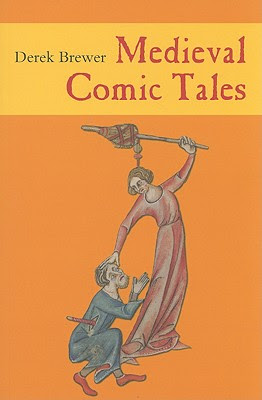In the time I have for recreation I chose the collection of Medieval Comic Tales edited by Derek Brewer to fill the hours before bed for a few evenings, and found it more than satisfactory for entertainment.
The book is categorised by nation and includes a selection of interesting or historically significant tales alongside those which appear to be solely entertainment. Like our own world, the medieval was a lewd and earthy one, which these tales illustrate. I don't recommend them for anyone of particularly morally squeamish ideas. Sometimes, the poor morals are an example of the way we aren't to live. Sometimes the rampant extramarital affairs of men and women seem to be expected or encouraged. The themes of the tales and the way they appear may be familiar to those who read fairy stories or modern fantasy. An observing mind will take notice of the fact that the human intellect remains what it was, half a millennia ago. As our nature is static, so is the palette from which we draw our stories: life and the oddities of survival.
I liked it because it was easy to read, the stories are all very short, and the introduction is a helpful treatise on the endurance and inspiration of comedy by a Cambridge man (the editor) so you know it's good. It's under two hundred pages and they flow quickly. While some are of dubious morality, others are strictly Christian, and others are fun, funny, or exciting. Coming from this current prejudiced era I found myself in surprise at the innovation in plot and character, a fact which should have simply affirmed an existing belief: that as we humans are not in a constant upward climb as some would suggest, our capabilities would be undiminished in antiquity as they are today.
 I imagine the tales told by a storyteller of intimate acquaintance; we are sat beside a fire in a hall that evokes the same authenticity as the words being read (or rather spoken from memory, should we be so fortunate); there's a wolfhound of some sort stretched by the warming glow at our feet, and so it continues whilst steam rises from a cup of something indistinguishable but importantly hot. If that image is appealing, pick a copy up when you get the chance. It's a title worth sitting on any shelf, and not one I would be ashamed to be seen in ownership of by man or beast.
I imagine the tales told by a storyteller of intimate acquaintance; we are sat beside a fire in a hall that evokes the same authenticity as the words being read (or rather spoken from memory, should we be so fortunate); there's a wolfhound of some sort stretched by the warming glow at our feet, and so it continues whilst steam rises from a cup of something indistinguishable but importantly hot. If that image is appealing, pick a copy up when you get the chance. It's a title worth sitting on any shelf, and not one I would be ashamed to be seen in ownership of by man or beast.

